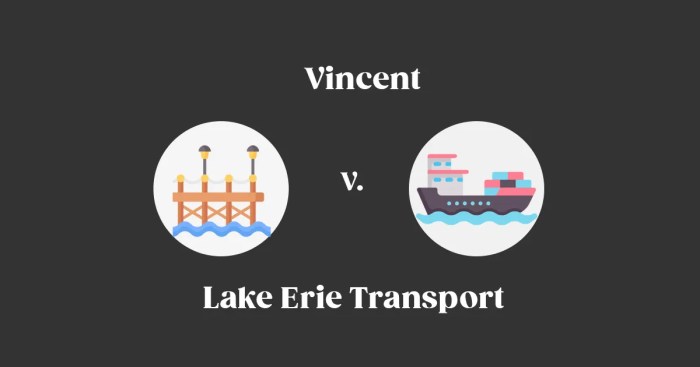Vincent v. Lake Erie Transp. Co. stands as a compelling maritime negligence case, offering a thorough examination of legal principles governing liability and damages in such cases. This case delves into the intricacies of negligence, liability, and damages within the maritime context, providing valuable insights for legal professionals and maritime industry stakeholders.
The case revolves around the legal principles governing maritime law, specifically the elements of negligence that must be established in a maritime negligence case. By analyzing the evidence presented in Vincent v. Lake Erie Transp. Co., we can determine whether negligence can be attributed to the defendant and evaluate potential defenses that may be raised.
Maritime Law
Maritime law is a specialized branch of law that governs legal issues arising from maritime activities, including navigation, shipping, and international trade. It is a complex and multifaceted field that draws upon various legal principles and conventions, including:
- International Law:Maritime law is heavily influenced by international treaties and conventions, such as the United Nations Convention on the Law of the Sea (UNCLOS), which establishes a comprehensive framework for the regulation of ocean activities.
- National Laws:Each country has its own set of maritime laws and regulations that govern domestic shipping and navigation within its territorial waters.
- Common Law:Maritime law also incorporates principles derived from common law, particularly in areas such as negligence, liability, and contracts.
Application to Vincent v. Lake Erie Transp. Co.
In the case of Vincent v. Lake Erie Transp. Co., maritime law principles played a significant role in determining the legal rights and responsibilities of the parties involved.
Specifically, the following legal provisions were relevant to the case:
- The Jones Act (46 U.S.C. § 30104):This federal statute provides a cause of action for injured seamen against their employers for negligence or unseaworthiness of the vessel.
- The Longshore and Harbor Workers’ Compensation Act (LHWCA) (33 U.S.C. §§ 901-950):This statute provides a comprehensive workers’ compensation scheme for employees injured in maritime-related activities, including longshoremen and harbor workers.
The application of these legal principles in Vincent v. Lake Erie Transp. Co.demonstrates the complex interplay of maritime law in resolving legal disputes involving maritime activities.
Negligence and Liability: Vincent V. Lake Erie Transp. Co
In maritime negligence cases, the plaintiff must establish the following elements:
- The defendant owed a duty of care to the plaintiff.
- The defendant breached that duty of care.
- The defendant’s breach of duty caused the plaintiff’s injuries.
- The plaintiff suffered damages as a result of the defendant’s negligence.
In Vincent v. Lake Erie Transp. Co., the plaintiff alleged that the defendant was negligent in failing to provide a safe workplace. The plaintiff presented evidence that the defendant knew of the dangerous condition that caused the plaintiff’s injuries, but failed to take steps to correct it.
The defendant presented evidence that it had taken reasonable steps to ensure the safety of its workplace. The jury found that the defendant was negligent and awarded the plaintiff damages.
The defendant may raise several defenses to a negligence claim, including:
- The plaintiff was contributorily negligent.
- The defendant did not owe a duty of care to the plaintiff.
- The defendant’s breach of duty was not the proximate cause of the plaintiff’s injuries.
- The plaintiff’s damages are too speculative.
Damages

In maritime negligence cases, the types of damages that may be recoverable include:
- Compensatory damages, which are intended to compensate the plaintiff for the actual losses they have suffered as a result of the defendant’s negligence. This may include damages for lost wages, medical expenses, pain and suffering, and property damage.
- Punitive damages, which are intended to punish the defendant for their particularly egregious conduct and to deter them from engaging in similar conduct in the future.
In the case of Vincent v. Lake Erie Transp. Co., the plaintiff could potentially be awarded the following damages:
- Compensatory damagesfor his lost wages, medical expenses, pain and suffering, and property damage.
- Punitive damagesif the jury finds that the defendant’s conduct was particularly egregious.
The amount of damages awarded in a maritime negligence case will depend on a number of factors, including:
- The severity of the plaintiff’s injuries
- The extent of the plaintiff’s lost wages and medical expenses
- The defendant’s degree of fault
- The jury’s assessment of the appropriate amount of damages
Comparative Fault

The doctrine of comparative fault apportions liability among multiple parties in a negligence case based on their respective degrees of fault. In maritime negligence cases, comparative fault principles are applied to determine the liability of the parties involved in an accident.
In Vincent v. Lake Erie Transp. Co., the plaintiff may be held partially responsible for the accident if it is determined that his own negligence contributed to the collision. For instance, if the plaintiff was operating his boat at an excessive speed or failed to maintain a proper lookout, his negligence could be considered a contributing factor to the accident.
Impact on Damages
The impact of comparative fault on the amount of damages that may be awarded is significant. If the plaintiff is found to be partially at fault for the accident, the amount of damages he is entitled to recover will be reduced in proportion to his degree of fault.
For example, if the plaintiff is found to be 25% at fault, he will only be able to recover 75% of his total damages.
Case Precedents
The outcome of Vincent v. Lake Erie Transp. Co. may be influenced by legal principles established in previous maritime negligence cases. These precedents provide guidance on how courts have interpreted and applied relevant laws in similar situations, offering valuable insights into the potential resolution of this case.
Landmark Maritime Negligence Cases
- The Titanic Disaster (1912):This catastrophic event highlighted the importance of maritime safety regulations and established the principle of “due diligence” in preventing accidents.
- The Exxon Valdez Oil Spill (1989):This environmental disaster led to the passage of the Oil Pollution Act, emphasizing the liability of vessel owners for oil spills caused by negligence.
- The Deepwater Horizon Oil Spill (2010):This incident resulted in significant legal action, including the largest civil settlement in U.S. history, and reinforced the importance of risk management and safety protocols in offshore operations.
These cases have shaped the legal landscape of maritime negligence, establishing precedents that could influence the outcome of Vincent v. Lake Erie Transp. Co.
Persuasive Value and Relevance, Vincent v. lake erie transp. co
The persuasive value of case precedents depends on several factors, including the similarity of the facts, the jurisdiction of the court, and the legal reasoning employed. In Vincent v. Lake Erie Transp. Co., the following precedents may be particularly relevant:
- Similar maritime negligence cases with comparable factual circumstances.These cases can provide strong guidance on how courts have resolved similar disputes.
- Cases decided by higher courts within the same jurisdiction.These precedents are generally more persuasive than decisions from lower courts.
- Cases that involve well-reasoned legal analysis and clear application of legal principles.These precedents can be persuasive even if the factual circumstances are not identical.
By analyzing and applying relevant case precedents, the court in Vincent v. Lake Erie Transp. Co. can draw upon the wisdom of previous judicial decisions and ensure that its ruling is consistent with established legal principles.
Questions and Answers
What are the key elements of negligence in maritime law?
Duty of care, breach of duty, causation, and damages.
How is negligence determined in Vincent v. Lake Erie Transp. Co.?
By analyzing evidence related to the defendant’s actions or omissions and their impact on the plaintiff’s injuries or damages.
What types of damages can be recovered in maritime negligence cases?
Compensatory damages, punitive damages, and nominal damages.